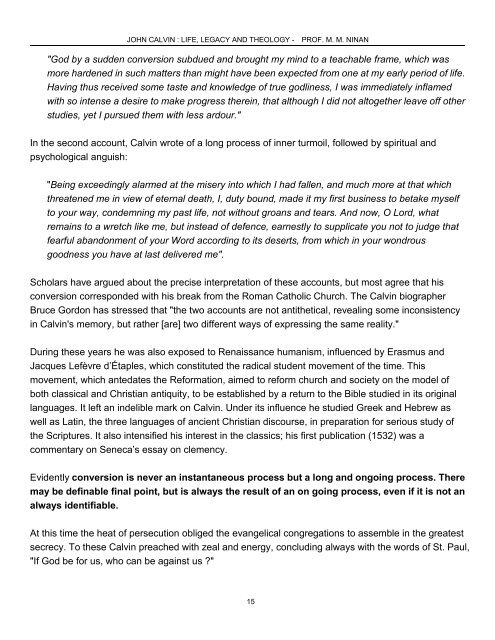Create successful ePaper yourself
Turn your PDF publications into a flip-book with our unique Google optimized e-Paper software.
JOHN CALVIN : LIFE, LEGACY AND THEOLOGY -<br />
PROF. M. M. NINAN<br />
"God by a sudden conversion subdued <strong>and</strong> brought my mind to a teachable frame, which was<br />
more hardened in such matters than might have been expected from one at my early period of life.<br />
Having thus received some taste <strong>and</strong> knowledge of true godliness, I was immediately inflamed<br />
with so intense a desire to make progress therein, that although I did not altogether leave off other<br />
studies, yet I pursued them with less ardour."<br />
In the second account, <strong>Calvin</strong> wrote of a long process of inner turmoil, followed by spiritual <strong>and</strong><br />
psychological anguish:<br />
"Being exceedingly alarmed at the misery into which I had fallen, <strong>and</strong> much more at that which<br />
threatened me in view of eternal death, I, duty bound, made it my first business to betake myself<br />
to your way, condemning my past life, not without groans <strong>and</strong> tears. And now, O Lord, what<br />
remains to a wretch like me, but instead of defence, earnestly to supplicate you not to judge that<br />
fearful ab<strong>and</strong>onment of your Word according to its deserts, from which in your wondrous<br />
goodness you have at last delivered me".<br />
Scholars have argued about the precise interpretation of these accounts, but most agree that his<br />
conversion corresponded with his break from the Roman Catholic Church. The <strong>Calvin</strong> biographer<br />
Bruce Gordon has stressed that "the two accounts are not antithetical, revealing some inconsistency<br />
in <strong>Calvin</strong>'s memory, but rather [are] two different ways of expressing the same reality."<br />
During these years he was also exposed to Renaissance humanism, influenced by Erasmus <strong>and</strong><br />
Jacques Lefèvre d’Étaples, which constituted the radical student movement of the time. This<br />
movement, which antedates the Reformation, aimed to reform church <strong>and</strong> society on the model of<br />
both classical <strong>and</strong> Christian antiquity, to be established by a return to the Bible studied in its original<br />
languages. It left an indelible mark on <strong>Calvin</strong>. Under its influence he studied Greek <strong>and</strong> Hebrew as<br />
well as Latin, the three languages of ancient Christian discourse, in preparation for serious study of<br />
the Scriptures. It also intensified his interest in the classics; his first publication (1532) was a<br />
commentary on Seneca’s essay on clemency.<br />
Evidently conversion is never an instantaneous process but a long <strong>and</strong> ongoing process. There<br />
may be definable final point, but is always the result of an on going process, even if it is not an<br />
always identifiable.<br />
At this time the heat of persecution obliged the evangelical congregations to assemble in the greatest<br />
secrecy. To these <strong>Calvin</strong> preached with zeal <strong>and</strong> energy, concluding always with the words of St. Paul,<br />
"If God be for us, who can be against us ?"<br />
15

















